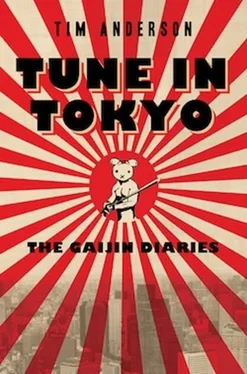I slide open his door and tiptoe in, my socked feet enjoying the tickle of the woven tatami underneath. From the bare-bones look of the room, it appears Ewan has really thrown himself into capturing the minimalist Japanese decorating style. There’s no furniture except for a folded futon on the floor and a small bookcase in the corner. Since I’m a snoop, I pad over to the closet space and start sliding open doors. Each cabinet holds absolutely nothing interesting. There are folded sweaters. Folded pants. Socks. A crate of underwear. A box of envelopes. Some pens. A disposable camera. I close the doors so I don’t collapse on the floor and plummet into a deep sleep, and then I turn and step lightly toward the bookshelf, hoping for the best. Since Ewan’s a bookish fellow, I figure he’ll have a respectable collection of titles to choose from. Maybe I’ll finally read The Brothers Karamazov , Look Homeward, Angel , or Dianetics .
Unfortunately, it turns out that his are the books I would read only if I had a gun to my head. Titles like If Lions Could Talk, Third World Geology , and The Psychology of Rabbits abound. My eyes brighten when I see the word “sex” in one of the titles, but it turns out to be The Sex Life of Plants .
I search and search his room looking for something, anything, readable. The most exciting thing I come across is a map of Yokohama, which I promptly swipe and have a read through. (It doesn’t hold my interest for long, too bogged down with details, unrealistic plot contrivances, soulless narrative…) Then I see a book about learning Japanese kanji characters, and I nearly run away screaming.
Though I planned to take some emergency Japanese lessons at Berlitz before arriving in Tokyo, I never actually got around to it, what with all the emergency CD shopping, emergency bar hopping, emergency beachgoing, emergency Internet surfing, emergency lying around, and emergency last-minute freaking out. I did buy a language book called Japanese the Fast and Fun Way and a Japanese-English dictionary, but the extent of my study has so far been a few perfunctory looks at their back covers (very nice: simple, colorful, practical).
Though I learned the two phonetic alphabets without too much trouble, I’m deathly afraid of the kanji symbols that make up the bulk of the written language. Not just because there are twenty thousand of them, each with two pronunciations. Not even because each symbol must also be written in a certain stroke order. (To a guy who mixes his cursive and printed script, and upper-and lowercase letters when he writes-KinD oF LikE this-this is absolutely out of the question.)
The last straw is the fact that kanji symbols are listed in dictionaries according to the number of strokes, so to find a specific kanji I must know that it has twelve strokes and not ten or fourteen. I’m not prepared for that kind of life.
Lying on Ewan’s futon is a workbook filled with his, er, stroke practice. I’m impressed. Sure, it looks like they were done by a three-year-old, but at least he’s trying, and that’s more than I can say for me. Seeing how Ewan is so hard at work learning his letters, I start thinking maybe it’s time I finally make that leap into the linguistic unknown. I came here, after all, to shock my system, to give myself over to new and even scary possibilities. So far it’s been very easy to live here knowing only a few phrases and hand signals. Some teachers have actually been here upwards of five years and still struggle to understand train announcements. Sure, it might seem incredibly lazy, but if your job is to speak English, then the need for fluency in Japanese isn’t so desperate on a day-to-day basis.
Ignorance may sometimes be bliss, but not when you’re wondering whether or not you’re on the right train or if what you’re about to eat is filled with bean paste and not chocolate. Besides, it’s my God-given right as an American to speak my mind and fill others’ ears with my thoughts, my opinions, my innermost feelings, and my repressed childhood memories. It seems a shame that I should let a tiny thing like a complete ignorance of the language keep me from doing it. I now know only a few more words than most Americans learned from that Styx song “Mr. Roboto.” This absolutely must change.
Yes, my honeymoon period is officially over. I am settled. I am working. It is time to hit the books and prepare myself for my future career in Japanese films, television, infomercials, music videos, car shows, or Internet porn, whatever. I decide I’ll ask around at work for a good teacher.
I work in the Kamiooka school of Yokohama, situated on a big shopping street across from the gigantic Kamiooka Station/Bus Terminal/Shopping Center, and above a Burger King, which means that the smell of french fries pervades the entire school and I must eat at least one large order every day.
The pace here, like that at a Burger King, is manic. Every day I teach about seven forty-five-minute lessons and then spend another forty-five minutes in the free conversation room, where students of all levels discuss whatever topic is suggested or move from topic to topic according to interest level. (Mostly the students just sit and stare at the teacher until the teacher says something.) The classes generally consist of three people, unless a student pays extra to have individual instruction. We have ten minutes between classes, during which we’re meant to grade each student on a number of points (listening, grammar, confidence, pronunciation, poise, dress sense, etc.), make recommendations, pass the file on to the next teacher, then get the files for our next class, open them up, and quickly choose a lesson that each hasn’t done yet or needs to do again based on comments written by a previous teacher.
It’s all very stressful and crowded in the tiny teachers’ room as we scramble for the limited number of seats, sometimes ending up writing our files while leaning against the file cabinet that other teachers keep needing to use or sitting on someone’s lap. This sense of pandemonium coupled with the smell of burgers, fries, and chicken fingers wafting through the room sometimes makes me feel as if I’m not actually an English teacher at all, but a fry cook.
Needless to say, we teachers have been forced to become intimate with one another, much like actors and actresses filming a love scene. Except our love scenes are every forty-five minutes and generally involve not two people, but ten.
And to make our lives that much more exciting, there’s the persistent presence of Jill, our head teacher from Australia, a woman who, in spite of her fondness for brightly colored blazers and hair bleach, possesses all the warmth and approachability of a Salem, Massachusetts, prosecutor circa 1654.
Jill likes to lord it over us minions with a firm hand and a furrowed brow. And, sometimes, a hot pink pantsuit. Her most pronounced personality trait, besides a tendency to dribble ketchup and mayonnaise all over herself while eating BK Flame Broilers, is her staunch Australian patriotism, coupled with a similarly staunch dislike of Americans. She’s surely the proudest, most irrationally nationalistic person from Australia I’ve ever met. Of course, most Australians are proud of their country and generally get a massive kick out of being Australian, it’s just that their pronouncements about their homeland don’t sound like government-sponsored propaganda the way Jill’s do.
I’d recently overheard her chiding a student in one of her classes in her high-pitched Betty Boop squeal: “Why do you want to go to America? America is dangerous . Australia is much prettier, and the people are so much nicer.” Apparently she also works for the Australian Tourism Board.
Читать дальше












